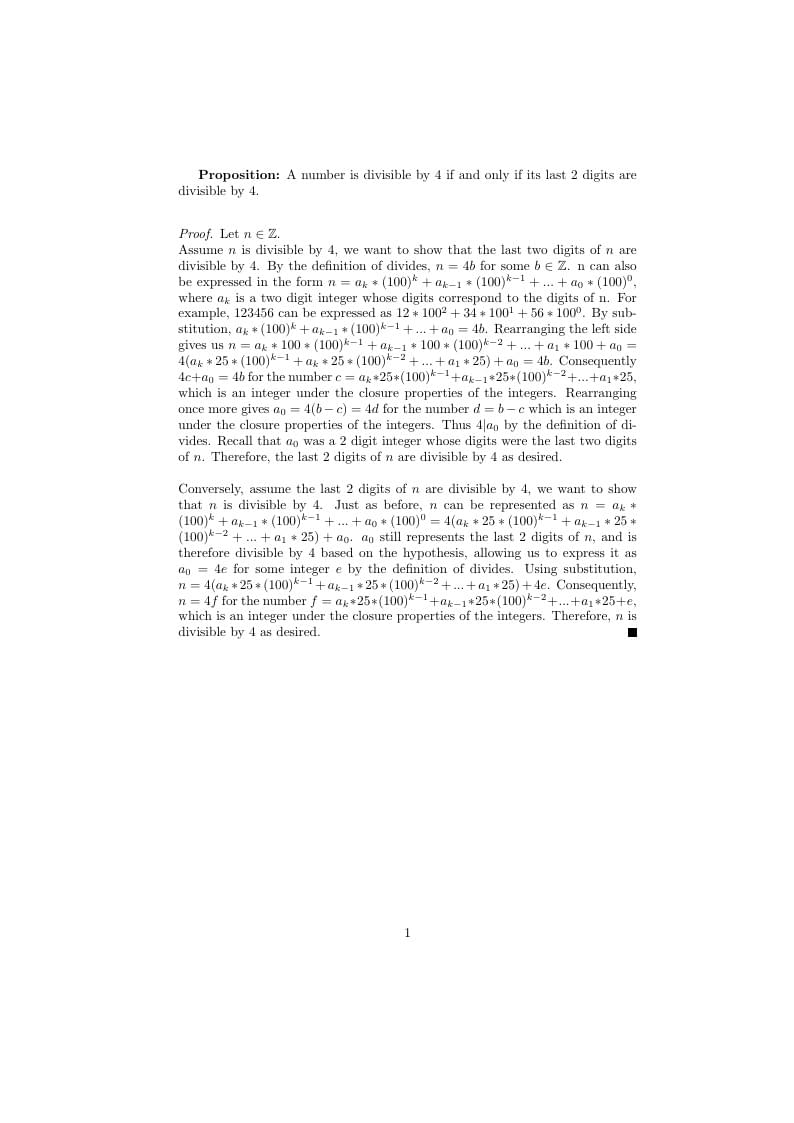
Divisibility by 4
Author:
Jacob Hofer
Last Updated:
6년 전
License:
Creative Commons CC BY 4.0
Abstract:
A proof of a number being divisible by 4

\begin
Discover why over 25 million people worldwide trust Overleaf with their work.
A proof of a number being divisible by 4

\begin
Discover why over 25 million people worldwide trust Overleaf with their work.
\documentclass{article}
\usepackage[utf8]{inputenc}
\usepackage{amsthm,amssymb}
\renewcommand{\qedsymbol}{\rule{0.7em}{0.7em}}
\begin{document}
\textbf{Proposition:} A number is divisible by 4 if and only if its last 2 digits are divisible by 4.\\
\begin{proof}
Let $n \in \mathbb{Z}$. \\
Assume $n$ is divisible by 4, we want to show that the last two digits of $n$ are divisible by 4. By the definition of divides, $n=4b$ for some $b\in \mathbb{Z}$. n can also be expressed in the form $n=a_k*(100)^k+a_{k-1}*(100)^{k-1}+...+a_0*(100)^0$, where $a_k$ is a two digit integer whose digits correspond to the digits of n. For example, 123456 can be expressed as $12*100^2+34*100^1+56*100^0$. By substitution, $a_k*(100)^k+a_{k-1}*(100)^{k-1}+...+a_0=4b$. Rearranging the left side gives us $n=a_k*100*(100)^{k-1}+a_{k-1}*100*(100)^{k-2}+...+a_1*100+a_0=4(a_k*25*(100)^{k-1}+a_k*25*(100)^{k-2}+...+a_1*25)+a_0=4b$. Consequently $4c+a_0=4b$ for the number $c=a_k*25*(100)^{k-1}+a_{k-1}*25*(100)^{k-2}+...+a_1*25$, which is an integer under the closure properties of the integers. Rearranging once more gives $a_0=4(b-c)=4d$ for the number $d=b-c$ which is an integer under the closure properties of the integers. Thus $4|a_0$ by the definition of divides. Recall that $a_0$ was a 2 digit integer whose digits were the last two digits of $n$. Therefore, the last 2 digits of $n$ are divisible by 4 as desired.\\\\
Conversely, assume the last 2 digits of $n$ are divisible by 4, we want to show that $n$ is divisible by 4. Just as before, $n$ can be represented as $n=a_k*(100)^k+a_{k-1}*(100)^{k-1}+...+a_0*(100)^0=4(a_k*25*(100)^{k-1}+a_{k-1}*25*(100)^{k-2}+...+a_1*25)+a_0$. $a_0$ still represents the last 2 digits of $n$, and is therefore divisible by 4 based on the hypothesis, allowing us to express it as $a_0=4e$ for some integer $e$ by the definition of divides. Using substitution, $n=4(a_k*25*(100)^{k-1}+a_{k-1}*25*(100)^{k-2}+...+a_1*25)+4e$. Consequently, $n=4f$ for the number $f=a_k*25*(100)^{k-1}+a_{k-1}*25*(100)^{k-2}+...+a_1*25+e$, which is an integer under the closure properties of the integers. Therefore, $n$ is divisible by 4 as desired.
\end{proof}
\end{document}